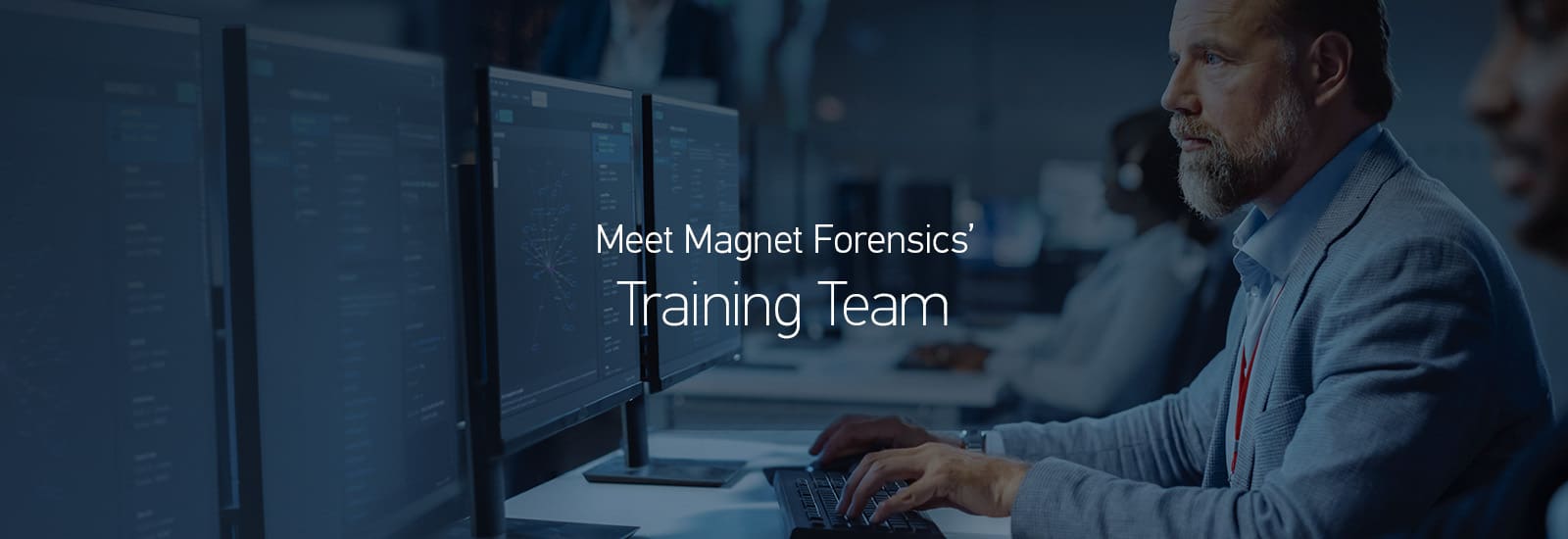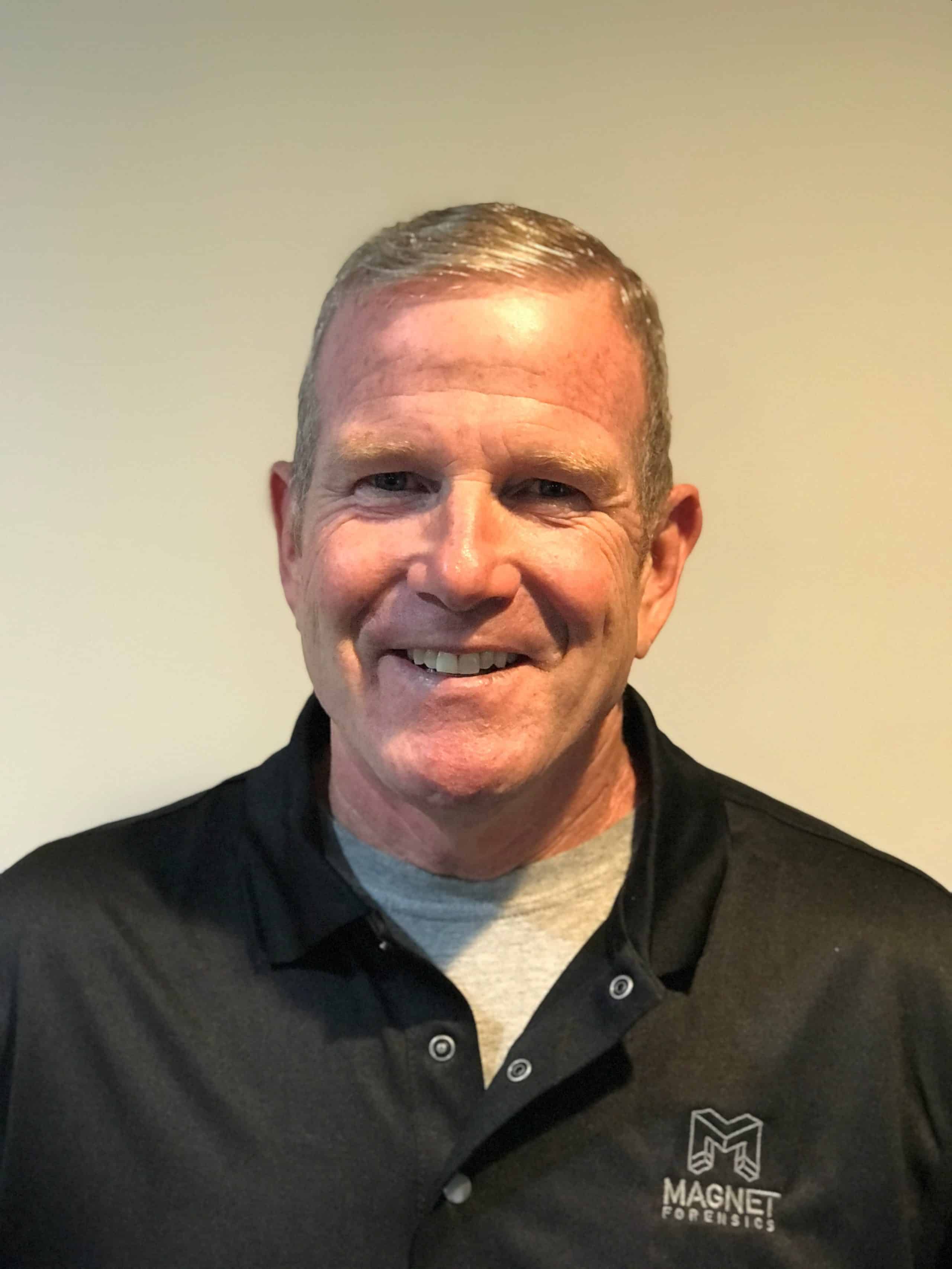
Meet the Magnet Forensics’ Training Team: Sean Boero
Introducing our newest member of the Training Team, Sean Boero
Sean joins us from a background in Law Enforcement and Management Consulting. Let’s get to know Sean!
Want to learn more about what courses are offered? Visit our Training & Certification page for more information.
MF: Tell us about your life before becoming a Trainer.
SB: I became a NJ State Trooper in 1987 after my time in the Marine Corps. I retired as the Unit Head of the Cyber Crimes Unit in 2012. During my State Police career I was a uniformed Trooper for the first 9 years and subsequently became a detective assigned to our Special Investigations and Financials Crimes Units in Atlantic City. I travelled to Toronto to give classes on casino crime during my time in Atlantic City. In 2004 the New Jersey Regional Computer Forensic Laboratory was opened and I was the Sergeant in charge of the State Police contingent. After my retirement, I was exceptionally fortunate to work with a small team of US Marines and British Army soldiers while deployed to Lashkar Gah, Afghanistan as a Police Advisor. In 2015 I was hired by the Ocean County Prosecutor’s Office as a management consultant and later as a detective specifically to acquire ISO/IEC 17025 Laboratory Accreditation. My entire life has been filled with extraordinary and talented people. In 2021 when the opportunity to be a trainer for Magnet Forensics presented itself, I applied and got the job. We have a great team of trainers.
MF: What made you want to be a Trainer?
SB: I really enjoy the learning and teaching process as well as the interaction with students. There has not been a day since I joined Magnet Forensics that I have not learned something new from the extraordinary staff. I enjoy teaching and sharing my experience with students as they learn how to use our software. I am also committed to protecting the innocent and seeking justice and want to share all that I have learned in my 30 year law enforcement career.
MF: What type of training have you taken part in personally? What is your favorite part of the role?
SB: Adobe Photoshop, Adobe Premier, Intergraph Video Analyst, Ocean Systems (Avid), CompTia Network +, CompTia A+, Access Data and their ACE certification, EnCase I and II, NW3C Mac and Crypto Currency, SANS 408, DME Forensics DVR Examiner, Berla Ive, IACIS CFCE and also currently serve as a coach for that extraordinary organization, Cellebrite CCO/CCPA, Autopsy, Griffeye, Axiom 100, 200, 250, 300 and 350 and more. Learning is lifelong and ongoing.
MF: What excites you the most about a new class?
SB: Learning new things and meeting new people. It is refreshing and invigorating to meet so many committed and bright people in our classes and there is always something new to learn from the material and our students.
MF: Do you ever learn anything from the students?
SB: Absolutely! There is something about gathering a group of energetic people committed to doing good things and sharing ideas, experiences, and techniques.
MF: Is there a particular moment that stands out the most to you in your career in the classroom?
SB: It is that the epiphany moment, the proverbial “lightbulb” moment. As a student myself I understand and appreciate the flood of new information coming at them that can be overwhelming and when the one phrase or demonstration clarifies a concept or technique for a student and the lightbulb goes off….it is a great time to be a trainer.
MF: What do students get out of training in person that they can’t get on their own?
SB: It is similar to walking through Manhattan without a map; you can figure it out eventually but it is so much more efficient and enjoyable to take a guided tour with a trainer who is experienced with the software. I often remark that Magnet’s software flattens the learning curve by presenting actionable artifacts rapidly while also source linking to the raw data, that is, handing the user with the proverbial map to where the forensic “gold” is. Gathering committed people of various backgrounds joined in accomplishing a challenging goal is a great learning environment whether virtual or in-person. The technology will continually update but the friendships and knowledge sharing will too.
MF: How prepared do you feel students are to use Magnet Forensics products after taking the training course?
SB: Very prepared. The course curriculum and material prepare the students to immediately start using the software. I know from personal experience by taking classes in the Magnet Forensics curriculum that I feel comfortable and able to apply the lessons learned during the training course to get right to work.
MF: What is most unique about Magnet Forensics’ approach to training?
SB: The scenario based instruction applied to real world scenarios using evidence types that will be encountered “in the wild” lead by experienced trainers. Using the Magnet Forensics software to answer the questions posed by the scenario make it fun and interesting to learn. By the end of the training week the students feel comfortable navigating the interface and exploiting the resources made available to them with this wonderful forensic software. Every day at the completion of training we compile a list of new things the students learned and we have a direct line of communication with our developers and regularly send in feature requests to add additional functions requested by the students to the software.
MF: How do you manage to keep up on the latest trends in digital forensics?
SB: Listening to and learning from the best resource I have available to me – the other Magnet Forensics Trainers and other Magnet Forensics employees. I am a member and a coach for the International Association of Computer Investigative Specialists and subscribe to their mailing list filled with subject matter experts from around the world who pose questions and answers for a wide variety of forensic challenges. In addition, I am continually subscribing to and reviewing information from a wide variety of subject matter experts and their respective blogs, YouTube channels, Twitter accounts and regularly check in with the Scientific Working Group on Digital Evidence and their website and published best practices. I have built a small digital forensic laboratory/Virtual classroom in my home and am always testing and validating my forensic tools. If I am not teaching I take the opportunity to take classes from other Magnet instructors and we regularly share ideas, techniques and “pro tips” with each other. Interacting with the students allows us to identify and understand what the latest trends are and address any hurdles.
MF: What trends do you see coming down the pipeline in digital forensics?
SB: More of the data we need to process will come from the “cloud,” and the volume of data and the speed at which the data is moving will continue to accelerate. The data stored on computers and mobile devices is just a starting point and now, more than ever, the devices we use are simply gateways to the data we need that is stored on servers, that is, another computer, all over our shrinking world.
Thank you, Sean! Welcome to the Training team and to Magnet Forensics overall—we look forward to seeing your future contributions.
Read our previous interviews with VP Training Chuck Cobb, Director of Training Operations Jamey Tubbs, Chris Vance, Patrick Beaver, Doug Estes, Lyn Goh, Larry McClain, Hoyt Harness, Jerry Hewitt, Chris Blight, Erich Schmidt, and Justin Almanza.
Click here to go to the Magnet Forensics Training and Certification Portal.
